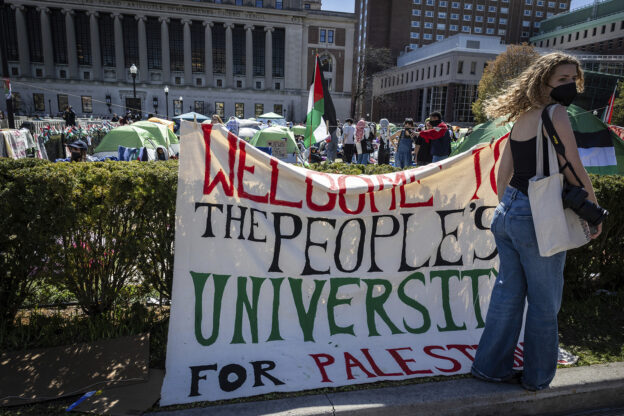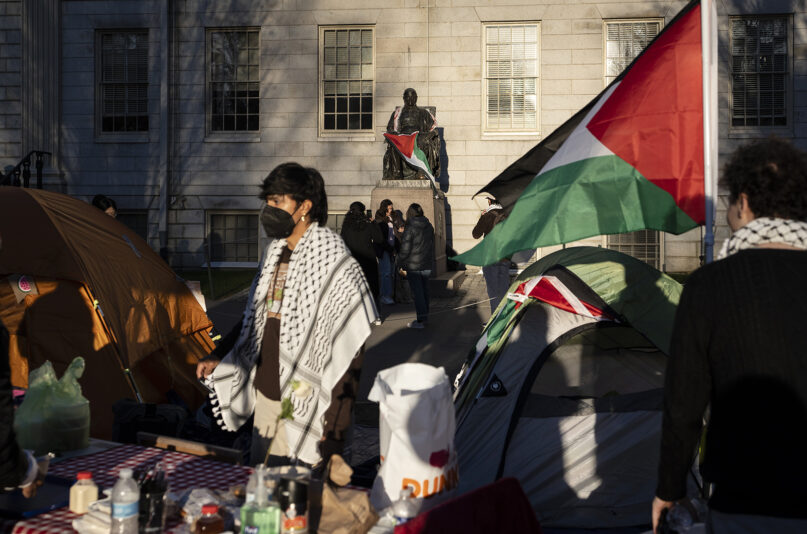
(RNS) — More than a year after thousands of students were arrested for staging pro-Palestine protests on campuses across the country, some Muslim student activists and other advocates say they haven’t been cowed by crackdowns meant to limit their organizing, calling instead for the schools to be held accountable for what the activists see as restricting students’ free speech.
Many vow they will continue to push their universities to divest from Israeli companies.
“What is happening right now is not a symbol of defeat,” said Salma Hamamy, a recent graduate who was a prominent protest organizer at the University of Michigan. “It’s a symbol of the strength that we built in the previous year, that our movement was so effective that the repression had to take such a form.”
Since the campus protests were shut down, surveys of students have found that police crackdowns against largely peaceful demonstrations have left them feeling that speech rights are not secure on their campuses. Muslim students feel the least sure of their freedom to speak, according to a survey by the campus free speech group Foundation for Individual Rights and Expression.
More than half (53%) of Muslim students surveyed from May 2024 to June 2025 said that the right to freedom of speech is “not at all” or “not very” secure on campus. Nearly half (48%) said the police response to campus encampments makes them feel “very” or “somewhat” unsafe at their schools. About a quarter of Jewish students agreed to these sentiments, according to the FIRE survey.
Another report, published by the advocacy group Muslim Public Affairs Council, suggests a “troubling landscape for student expression.” MPAC’s Academic Freedom Report Card gave poor and failing grades to more than half of the 20 universities it examined, including the University of Michigan, UCLA and Columbia University.

New York City Police Department officers arrest pro-Palestinian protesters outside a student-led encampment at New York University, April 22, 2024, in New York. (AP Photo/Noreen Nasir)
Haris Tarin, MPAC’s vice president of policy and programming, said he is using the report to talk with university administrators about how they can better respond the next time students protest en masse. But he said they must first take accountability.
“Accountability is acknowledgment that they screwed up, in layman’s terms,” Tarin said. “They gave in to the powerful and influential at the moment when they were supposed to protect the most vulnerable, which were their students.”
The University of California-Riverside received an A grade in the MPAC report for not arresting students and for instead negotiating with them, which Tarin said should have been the default way to handle student protesters.
Besides their use of force, universities got poor grades if they subscribe to the International Holocaust Remembrance Alliance’s working definition of antisemitism, which MPAC scored as suppression of pro-Palestinian speech.
The definition describes antisemitism as “a certain perception of Jews, which may be expressed as hatred toward Jews” that may be directed toward “Jewish or non-Jewish individuals and/or their property, toward Jewish community institutions and religious facilities.”

A student protester stands in front of the statue of John Harvard, the first major benefactor of Harvard College, draped in the Palestinian flag, at an encampment of students protesting against the war in Gaza, at Harvard University in Cambridge, Mass., April 25, 2024. (AP Photo/Ben Curtis, File)
Misaal Irfan, a spokesperson for MPAC and lead researcher on the project, said the way universities have interpreted the definition often conflates antisemitism with anti-Israel sentiments. “It becomes this challenge of students being labeled as something that they’re very far from being just because they refuse to accept this very problematic definition of antisemitism,” Irfan said. “And that not only hurts, you know, pro-Palestinian or Muslim or Arab students, but even Jewish students, or anyone that has any appreciation for free speech.”
MPAC’s report focused on a small number of universities and surveyed fewer than 100 students and professors for its analysis. But Nathan Honeycutt, a research fellow at the Foundation for Individual Rights and Expression, said his research generally confirms the findings of MPAC’s survey.
Honeycutt said his organization’s work, and that of MPAC and others, is important in making sure universities reflect on last spring’s protests and consider meaningful policy reform. Otherwise, he said, similar repression will happen again.
“Some took what happened on campuses back in 2024 as an opportunity to reassess, saying: ‘Hey, our response wasn’t great. We’re going to change,’” he said. “But for the most part, many universities went the other direction.”
Administrators have implemented more restrictive policies, sanctioning student groups and setting up roadblocks to bringing speakers or engaging in protest activities, Honeycutt said.
Zaid Yousef, a third-year student at University of California, Berkeley School of Law and a member of Students for Justice in Palestine, said his university has pushed back hard against all forms of student organizing, including events not related to Palestine advocacy. Speaker events, he said, have been canceled with little explanation and students were recently arrested after allegedly hanging a cardboard sculpture of an insect dressed in a rainbow scarf to protest a Turning Point USA event on campus.

A passerby, right, walks through a pro-Palestinian encampment of tents, April 25, 2024, on the Massachusetts Institute of Technology campus, in Cambridge, Mass. (AP Photo/Steven Senne, File)
Yousef said he’s most troubled by the university’s decision in September to send the Trump administration 160 names of students and faculty members for an investigation into alleged antisemitic incidents. “This is a university that advertises itself as the home of the free speech movement,” Yousef said. “So it’s the irony of ironies that this semester, we’re looking at some of the most repressive tactics that we’ve ever seen.”
Despite increasingly restrictive tactics, Yousef said there’s still “overwhelming support” for Palestinian freedom on his campus. A week of action at Berkeley in October turned out hundreds of people for a walkout, workshops and events, he said. While there are fewer protests on campuses, student activists say that the pro-Palestine student movement is still strong.
Yousef said the student movement is turning away from a “reactionary and defensive position” to strategic organizing to win university divestments from Israeli-linked investments. “That’s how we build a sustainable movement and one that gets its long-term goals achieved,” he said.
Hamamy, the Michigan graduate, said students are figuring out how to “work around the repression,” by studying the ways universities and the government responded to the protests. She added that studies about the encampments are important because they help ensure universities don’t rewrite the narrative about how they treated her and her peers.
“It allows us to feel grounded and confirmed in our own systematic oppression that we’re experiencing today,” Hamamy said. “It can also be used as a reminder that the universities were complicit and it actually sets the foundation for how we communicate about Palestine in the future.”
Anna Broderick, a senior at Georgetown University who was involved in encampments there last year, said she worries about who will write the history of the student movement. She says college administrators and the general public celebrate anti-Vietnam War protests of the 1970s, despite the opposition and backlash that they faced at the time.
“I have no doubt that that’s going to happen in 40 years when people look back at this period and they’re like ‘look at the brave students,’” Broderick said.
